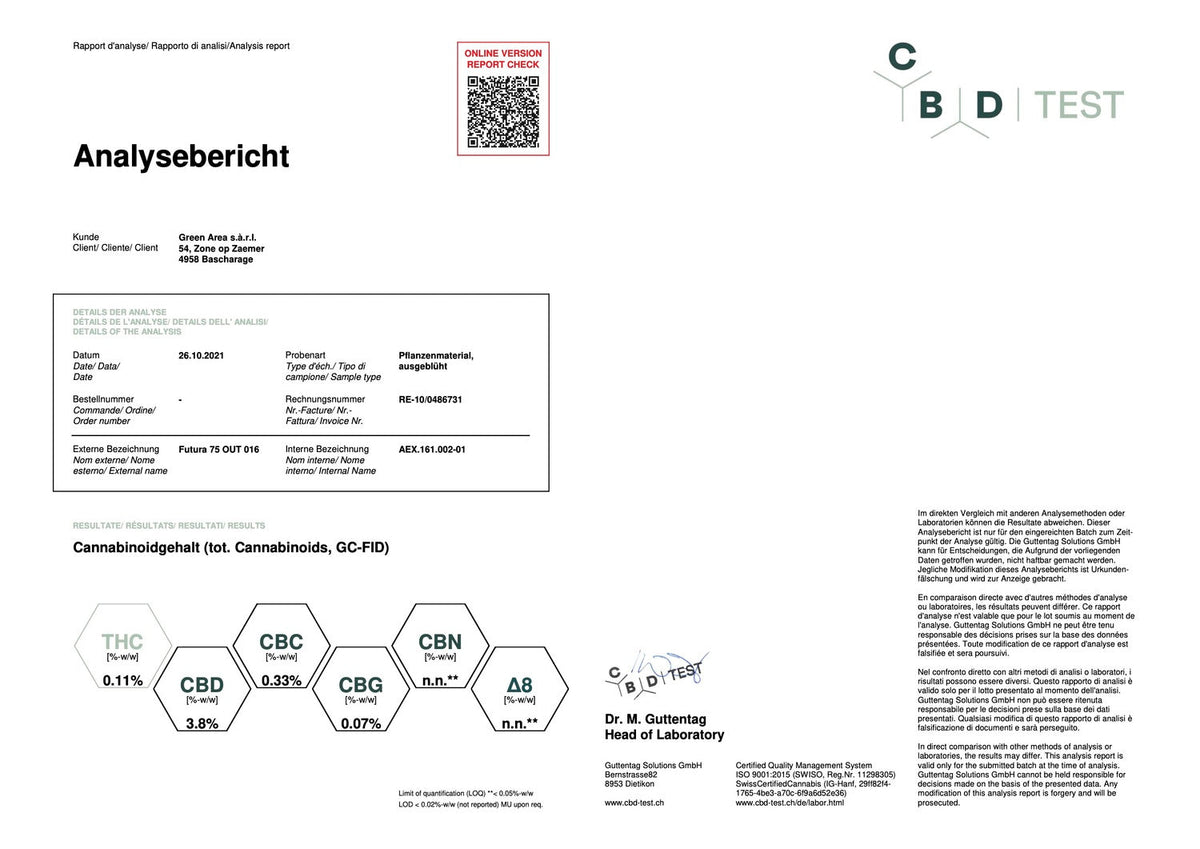
-10% ON YOUR FIRST ORDER WITH THE CODE WELCOME ! DELIVERY 48/72h IN UK & EU, FREE FROM €69.
Listen to this article:
CBD is a very popular molecule, which has appeared in a large number of products. But announcing the presence of CBD does not in itself constitute any guarantee to the consumer. In fact, there has been no harmonization of manufacturing standards. This is precisely what certain manufacturers take advantage of, who can promise the best profits for low dose, or even poor quality, products. It is therefore important to find out about what you are buying. This is the reason why a growing number of players are attaching CBD analysis certificates to their products. These are often directly available on online or in-store sales sites .
These certificates are the results of tests carried out by independent laboratories which we advise you to read. In this article we will explain to you what to look for in certificates of analysis and also how to interpret their content.
We can consider that the absence of testing is a first indicator of a seller's level of confidence. Indeed, serious players in the CBD market use independent third-party laboratories. They carry out analyzes on their products to provide more transparency. These tests serve to reassure the consumer in a constantly evolving market. Typically, the CBD analysis certificate for a flower provides the levels of the different molecules present in the tested sample. For example the concentration of CBD, CBG and THC.
Here's what to look for in a lab report:
Although the label indicates the amount of CBD present in the product, generally given in milligrams, it may vary from one brand to another. Testing from a third-party laboratory will allow you to verify whether the container corresponds to the contents.
The hemp plant naturally contains a small amount of THC, which is the molecule known for its ability to put us in a daze. Rest assured, the amount of THC is so tiny that it has no effect on you. However, it is important to check if the quantity of THC is equal to or less than 0.3%, the legal limit authorized in France in hemp products. This limit varies depending on the country (for example 0.5% in Italy or 1% in Switzerland). This explains why some online sales sites offer products containing a higher rate.
Let us point out that there are of course CBD-based products that do not contain any traces of THC . The CBD certificate of analysis makes it possible to ensure this, which is particularly useful for athletes; THC remains in fact considered a doping product in certain disciplines.
A cannabinoid profile gives you details on the molecules contained in your product, knowing that there are three types of CBD extraction: “ full spectrum ”, “broad spectrum” or “isolate” extraction. In the first case, we must cite all the molecules naturally present in the flower (CBD, CBDa, CBG, THC, etc.). To be compliant, the second must display the same molecules, without THC. Finally, Isolate is only supposed to contain CBD. The certificate therefore allows you to check the concordance between the type of extraction announced and the molecules actually present in the product.
Other things to look for in a certificate:
Remember to check the date of the analysis. The more recent the date, the more likely the analysis will reassure you. If the analysis is after one year, this means that the same is true for the product analyzed. We also advise you to cross-reference the analysis date with the production date of the product in order to validate its authenticity.
Logic dictates that the certificate that an independent third-party laboratory carries out the analyses. But what is it really? Is the laboratory really unaffiliated with the producer? Is it recognized in the field of CBD analyses? A simple internet search should let you know for sure.
This analysis process has a certain cost, and some unscrupulous actors do not hesitate to falsify certificates. We recommend looking at the certificate closely to see if the date or customer name has been altered with an image editing tool. If you have any doubt, do not hesitate to contact the laboratory to make sure.
To conclude, you will have understood that it is in your interest to take the time to read a certificate of analysis for any CBD product. This allows you to be informed about what you consume, to ensure the legality of the product and to be reassured about its conformity.
The CBD offering is booming and you will of course find many serious players that you can trust. If you would like to find out more, we invite you to consult the website of this renowned French laboratory:
LEAF : https://www.lab-leaf.com/
Submit your email to get updates on products and special promotions.

